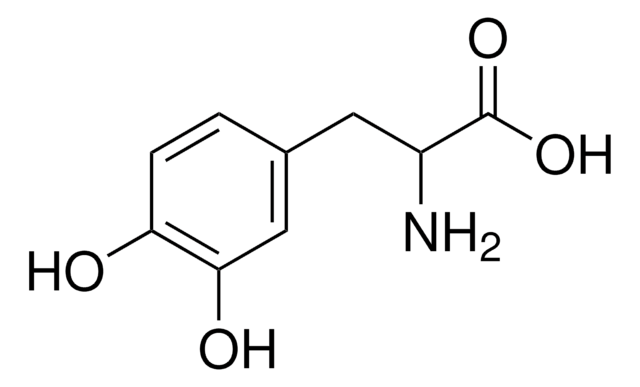H0751
Homogentisic acid
crystalline
Synonym(s):
2,5-Dihydroxyphenylacetic acid
Sign Into View Organizational & Contract Pricing
All Photos(1)
About This Item
Linear Formula:
(HO)2C6H3CH2CO2H
CAS Number:
Molecular Weight:
168.15
Beilstein:
2692860
EC Number:
MDL number:
UNSPSC Code:
12352100
PubChem Substance ID:
NACRES:
NA.22
Recommended Products
form
crystalline
color
off-white to tan
mp
150-152 °C (lit.)
storage temp.
2-8°C
SMILES string
OC(=O)Cc1cc(O)ccc1O
InChI
1S/C8H8O4/c9-6-1-2-7(10)5(3-6)4-8(11)12/h1-3,9-10H,4H2,(H,11,12)
InChI key
IGMNYECMUMZDDF-UHFFFAOYSA-N
Looking for similar products? Visit Product Comparison Guide
General description
Homogentisic acid (HGA) is an intermediate formed during the catabolism of phenylalanine and tyrosine. Alkaptonuria, a metabolic disorder, is characterized by high levels of HGA in serum and urine due to the deficiency of the enzyme homogentisic acid oxidase, which is involved in the degradation of HGA.
Storage Class Code
11 - Combustible Solids
WGK
WGK 3
Personal Protective Equipment
dust mask type N95 (US), Eyeshields, Gloves
Choose from one of the most recent versions:
Already Own This Product?
Find documentation for the products that you have recently purchased in the Document Library.
Customers Also Viewed
Huaixin Zheng et al.
Infection and immunity, 81(11), 4182-4191 (2013-08-28)
Iron acquisition is critical to the growth and virulence of Legionella pneumophila. Previously, we found that L. pneumophila uses both a ferrisiderophore pathway and ferrous iron transport to obtain iron. We now report that two molecules secreted by L. pneumophila
Laura Tinti et al.
Rheumatology (Oxford, England), 50(2), 271-277 (2010-10-19)
Alkaptonuria (AKU) is a genetic disorder caused by lack of the enzyme responsible for breaking down homogentisic acid (HGA), an intermediate in tyrosine metabolism. HGA is deposited as a polymer, termed ochronotic pigment, in collagenous tissues. Pigmentation is progressive over
Homogentisic acid autoxidation and oxygen radical generation: implications for the etiology of alkaptonuric arthritis.
Martin Jr, et al.
Free Radical Biology & Medicine, 3(4), 241-250 (1987)
V S Venkataseshan et al.
Modern pathology : an official journal of the United States and Canadian Academy of Pathology, Inc, 5(4), 464-471 (1992-07-01)
In alkaptonuric ochronosis, the absence of homogentisic acid oxidase results in the accumulation of homogentisic acid in the body. Associated renal failure is rare and usually occurs in the later stages of the disease. We report a 19-yr-old girl who
Z L Hegedus et al.
Archives internationales de physiologie, de biochimie et de biophysique, 102(3), 175-181 (1994-05-01)
Homogentisic acid (HGA) spontaneously starts to undergo oxidation and polymerization soon after the beginning of incubation in human blood or plasma at 37 degrees C, and forms plasma soluble melanins (PSM). Haemolysis accompanies this process in blood. The addition of
Our team of scientists has experience in all areas of research including Life Science, Material Science, Chemical Synthesis, Chromatography, Analytical and many others.
Contact Technical Service










